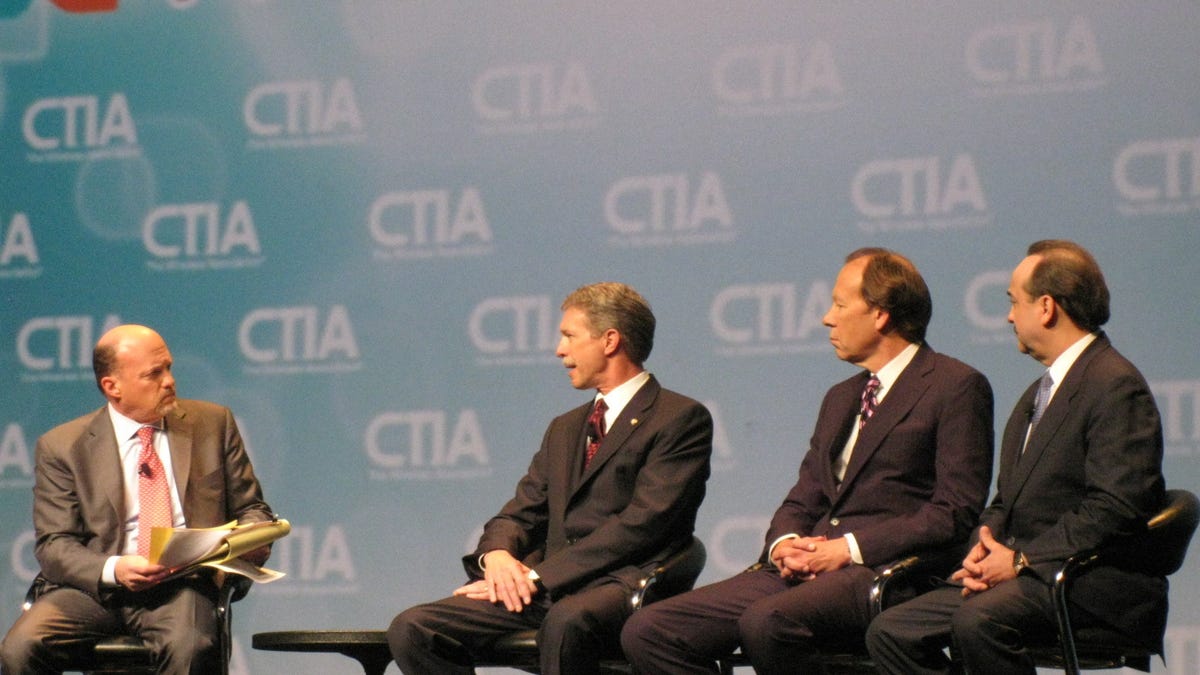Wireless CEOs spar onstage at CTIA
Chief executives at AT&T, Verizon Wireless, and Sprint are forced to discuss the elephant in the room: AT&T's proposed acquisition of T-Mobile USA.

ORLANDA, Fla.--After a slow start, the gloves came off at the CTIA panel of wireless CEOs hosted by CNBC's Jim Cramer here today.
Cramer, who was hosting the panel as part of the morning keynote at the CTIA 2011 trade show, started off the quick-fire discussion with AT&T wireless chief Ralph de la Vega, Verizon Wireless CEO Dan Mead, and Sprint Nextel CEO Dan Hesse by addressing the "elephant" in the room: AT&T's $39 billion proposed acquisition of T-Mobile USA, which was announced Sunday afternoon--two days before the big industry event here.
"You know you ruined everyone's Sunday," he joked.
The deal, which would make AT&T the largest wireless carrier in the U.S. with nearly 130 million subscribers and would likely give AT&T and Verizon Wireless nearly 80 percent control over the wireless market, could significantly alter the competitive landscape in the U.S. wireless market. Primarily, the deal would eliminate the smallest of the four major U.S. wireless carriers, T-Mobile USA, which has traditionally been a price leader in the industry. It would also create a market in which only one major carrier in the U.S.--AT&T--would have the more widely used GSM cellular technology.
De la Vega said his company's interest in T-Mobile is all about spectrum and expanding coverage of 4G LTE services.
"One of the biggest drivers [for this acquisition] is the need for additional spectrum," he said. "Data on our network has grown 8,000 percent in four years. Few things grow that much in four years. What we saw is this will help alleviate the spectrum exhaust that both companies are facing."
The lack of available spectrum was also something that Federal Communications Commission Chairman Julius Genachowski emphasized during his speech at CTIA right before the keynote panel. Genachowski noted that the FCC is currently working to free about 500MHz of wireless spectrum to be primarily used for wireless broadband in the next decade--a key recommendation that came out of the National Broadband report.
But not every executive onstage agreed that a merger of this size is needed to solve the spectrum crunch. When asked about it directly, Sprint's CEO elegantly avoided the question: "My opinion doesn't matter," he said. "That's for the FCC and DOJ to decide."
But Hesse said generally he is concerned about consolidation in the wireless market and how it would stifle innovation. As for helping bring 4G LTE services to more Americans, Hesse cracked: "I thought AT&T and T-Mobile already had 4G."
AT&T and T-Mobile have been marketing their HSPA+ market as 4G, a situation which many in the industry say plays fast and loose with the network terminology.
Meanwhile, Verizon Wireless' CEO said he is not concerned at all by the AT&T deal to acquire T-Mobile. Mead said he disagrees with people who call the deal anti-competitive. Instead, Mead brought the issue back to spectrum. And although Verizon professes to have a very strong spectrum position, he advocated for more spectrum to be made available for the market.
"The underlying issue is about having a sound spectrum policy," he said. "We think there is a tremendous amount of competition in the market."
When asked if Verizon had considered buying T-Mobile, Mead flatly said no. (That's not a surprise considering the two carriers use completely different network technologies: T-Mobile and AT&T use GSM, while Verizon and Sprint use CDMA.) But Mead's answer to the question had more to do with the company's spectrum position.
"We didn't think through that," he said. "We didn't think it was a need. We've been through a series of great acquisitions, and we are very confident in where we are at."
While an AT&T acquisition of T-Mobile won't affect Verizon too much, it could have a very negative effect on Sprint. Cramer asked Sprint's CEO how the company can combat such big companies when it comes to subsidizing handsets. Cramer said it is well known that Sprint pays more to handset makers than any other carrier to subsidize the hottest phones. And he implied the situation could get stickier as the industry consolidates and AT&T and Verizon Wireless exert more buying power.
"We can afford to do a lot of things," Hesse said. "There's no question that subsidies will increase as devices get more powerful. But the good thing for us is that in smartphones there is higher ARPU [average revenue per user] and churn tends to be lower. So the overall value of the customer is higher than for non-smartphone users."

